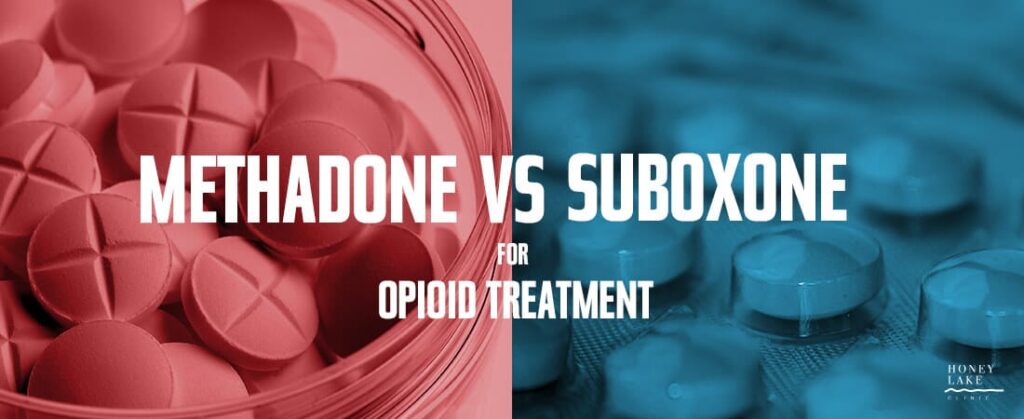Methadone vs. Suboxone for Opioid Treatment
America’s Opiate and Heroin Epidemic
Just a glimpse at the headlines and it’s evident—the abuse of opioids such as heroin, morphine and prescription pain killers has risen to epidemic numbers.
According to the National Institute on Drug Abuse, an estimated 2.1 million Americans suffer from substance use disorders related to prescription opioid pain relievers, with a further 467,000 estimated to be addicted to heroin.
If you or someone you love is struggling, don’t wait. Speak confidentially with a counselor right now. Make the call. (888) 837-6577.
When used properly, prescription opioids can be helpful pain-relief, cough suppression and antidiarrheal medications. The danger, however, is that opioids often give a powerful high or euphoria your brain can start to crave. Opioid medications carry a high potential for abuse, dependence and addiction. The numbers are sobering—
- Prescriptions for opioid pain relievers have increased dramatically in the last 25 years.
- The number of overdose deaths from prescription pain relievers has skyrocketed in the U.S. since the turn of the century.
Studies show a connection between the abuse of opioid pain relievers and heroin use. The progression from abusing prescription opiates to using heroin is frequently seen, especially in young people, as heroin has become more accessible and cheaper.
Treatment Options for Opioid Addiction
There are many treatment options available for people battling opioid addiction. Often, programs employ medication-assisted treatment with behavioral therapies and education. This manner of addressing your addiction will allow you to detox with the aid of medication, helping to alleviate or reduce withdrawal symptoms. This process allows you to focus more intently on all parts of your recovery.
Methadone vs. Suboxone
The two types of medications most often used to treat opioid addiction are methadone and suboxone. What are they? How are they different? Which one is right for you?
Do you want to talk to someone about treatment? Let us answer your questions and encourage you. Call now to speak with someone—(888) 837-6577.
What Is Methadone?
Methadone is an opioid pain reliever often used to help treat the symptoms of opioid withdrawal—essentially one opioid replacing others in your system—as part of an overall treatment plan which includes behavioral therapies, counseling and a support program.
Methadone is a full agonist, which means it produces a full opioid effect, and can be addictive. For these reasons, it must be used as prescribed and closely monitored to avoid addiction and other dangerous side effects.
What Is Suboxone?
Suboxone contains two different medicines, buprenorphine and naloxone.
Buprenorphine is an opioid partial agonist. This means, like opioids, it produces effects such as euphoria or respiratory depression. However, unlike heroin or methadone, the effects of buprenorphine are weaker. Even after increased doses, buprenorphine levels off, giving it a contained effect, lowering the risk of misuse, dependency, and other side effects.
Naloxone—often referred to by its commercial name Narcan—is a medication used to block the effects of opioids, especially in overdose situations.
This combination of naloxone and buprenorphine help deter abuse.
Methadone vs. Suboxone
Because of its tempered effect, suboxone causes less respiratory depression than methadone, and also has a lower risk of overdose. It is not without its risks, however. When used with other respiratory depressants, buprenorphine can create sedation, coma, or even death. Depending on the specifics of your needs, however, buprenorphine is an evidence-based treatment option through which many have had great success.
Methadone can be more useful if you need help with structure, while suboxone is less stressful on the daily schedule. For some people, this may be one of the biggest concerns—methadone treatment requires daily visits to a clinic, while suboxone allows you the option of receiving a prescription on a monthly basis.
Perhaps most importantly, though buprenorphine does have a limited opioid effect and a potential for misuse, it is not nearly as great as the risk of addiction that occurs with methadone. Due to the full opioid effects of the methadone, there are also greater health risks and dangers associated with this form of treatment.
Let Us Help You Find Treatment Options
Don’t let an opioid addiction take over your life. Our staff is standing by to answer any questions you might have about drug abuse, addiction, or treatment.
It’s important to recognize, abuse and addiction don’t happen in a vacuum. The path to recovery and wholeness involves getting to the root the problem. To get at underlying hurt and bring lasting healing takes a holistic—spirit, mind and body—approach to addiction diagnosis, management and treatment.
At Honey Lake Clinic, our experienced doctors and staff strongly believe that faith-based treatment, encompassing spiritual, physical and mental health, will help clients and their families bring spiritual power and clearer psychological understanding to their healing and recovery.



